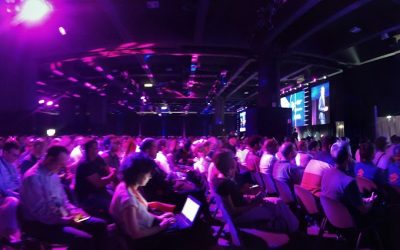As we have seen in the previous article, Agile culture was born to meet the growing needs in the software sector. In recent years, this new mindset approach to the work has been going beyond the IT field. In fact, it begins to be applied in a growing number of sectors, from Marketing to Automotive to Manufacturing. This was the topic we further discussed during the Meetup, held in Venice on May 15.
We interviewed Fabio Armani and Felice Pescatore who, thanks to their multi-year coaching experience, have been able to illustrate the importance of the change Agile is bringing in the panorama of Italian and foreign companies in different sectors. Interviews can be found at the end of this article or on our youtube channel.
FABIO ARMANI
Fabio Armani, an independent professional, has been working for over twenty-five years in the field of Information Technology. He defines himself as a coach, a senior consultant, and sometimes a trainer, as he helps companies in improving their business through a mindset change about the development process. He works closely with not only managers but also production teams to help them understand and assimilate the principles and values of Agile culture.
His job is to clarify at all business levels the need for change to allow the evolution of the company, suggesting solutions suited to the level of assimilation of the Agile culture.
AGILE: PEOPLE BECOME THE PROJECT FOCUS
The agile word, as Armani explains, can be seen as a simple adjective or as a cultural movement.
In the first case, when it comes to agility in the world of doing business, it comes natural to think to bodies quick in understanding the transformation that is taking place in the market. As a consequence, being agile means having the possibility and capability to change your own business shape, but being, at the same time, rigid in responding effectively to problems, and being liquid, or capable of adapting to changes in the context in which the business operates.
When we talk about Agile , we talk about a cultural movement born in the late 90s in the world of IT, as we already said in a previous article.
The Agile manifesto establishes the foundations to help companies change their way of working and emancipate themselves from outdated methodologies, based on rigid processes, that make impossible for companies to adapt to current market and business needs.
In this scenario of “wrong companies”, Agile culture sets itself as a new mindset that places people, relationships and value creation for the customer at the center of the company.
So, Armani concludes saying that companies to generate value must overcome the fear of change, must completely revisit their internal structure and modify it to put people at the center of each project.
THE IMPACT OF AGILE CULTURE ON BUSINESS WORLDWIDE
Armani explains how not all companies equally respond to change. Their response, in fact, heavily depends on their structure, size, and location.
Companies that can get the most out of Agile are those between 10 and 500 employees, because the passion for what they do is still very strong. Consequently, when they realize that things are not going as they should, they have a very strong will to challange themselves compared to larger entities.
In companies with more than 2000 employees, there is a great difference between the international and the Italian ones. The former are geared towards business growth, and feel the urgency of change. The big Italian companies, on the contrary, are still very stuck in an obsolete culture, which drives them to be more interested in things that have little to do with the heart of the company. In this case, a coach has the task of creating knowledge and, consequently, a need without forcing or imposing the change.
FELICE PESCATORE
Felice Pescatore is a computer engineer whose primary focus is to help international companies, especially in the energy, banking and automotive sectors, to become more dynamic and oriented to value-creation.
His greatest interest since 2000 is to understand how agile methodologies can go beyond the classic boundaries of the software world.
His daily activities range from Agile Coaching and Software Architecture, focused on seeking innovative solutions for often bankruptcy contexts, to leveraging Agile-based approaches.
During his interview, Pescatore mentioned at the beginning of how Agile culture can also be introduced in reality different from the IT and afterwards, he spoke about DevOps.
AGILE AND AUTOMOTIVE
Agile brings into the work world a new approach that, as it has been said before, is based on creating value for the customer. The principles and values of Agile, according to Felice, are relevant to all production contexts. His coach activities, in fact, led him to work in the automotive sector, which is traditionally a rigid production environment. The development of a car, in fact, is divided into several business silos that have little communication between each other, so problems often come to light only when the different individually designed parts are integrated. In these contexts, Agile can help bring the concepts of modularity, extensibility and adaptability to businesses, as well as improving communication between teams. All this helps to prevent problems, reducing risks, costs and increasing the value of the final product.
WHAT IS DEVOPS
A very common method of Agile in companies is DevOps. Its the main purpose is to break the existing barriers between development teams (dev) and deployment or production teams (Operations), which have different rhythms and approaches to work. Pescatore defines it as a continuation of Agile as it adds the automation element with the introduction of tools that can replace manual work in all those standard and repetitive actions. This new organizational model of work reduces software release times. At the base of DevOps there are 3 principles:
- flow: which implies having the total vision of the release line, not just in development;
- feedback: Get constant feedback that solves the problems you just encounter, so you can reduce their impact on costs and the value of the final product;
- learning: to have a continuous improvement within the company, this means being even more prone to the change that the market imposes.
Therefore, DevOps is not a tool but a cultural change, as it represents a new approach to delivery.
CONCLUSIONS
In this article we have seen what experts say about the Agile culture and its applications in companies that are very different, by sector, size, and placement.
Experts confirm the need for a change in the business focus that brings people, relationships, customer and value creation to the core of every business activity.



